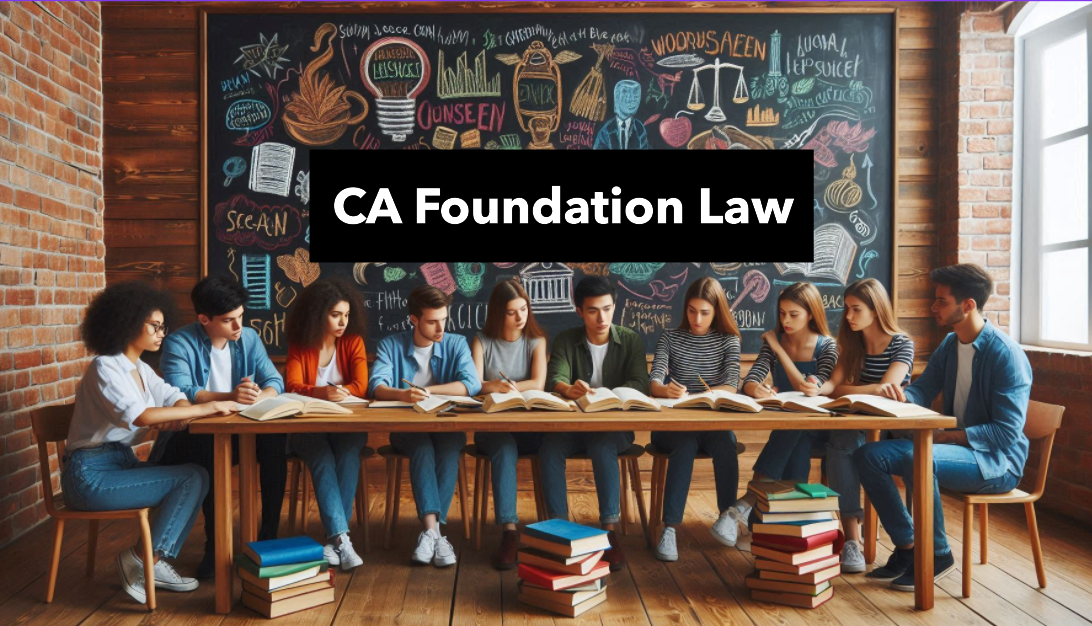The CA Foundation Law paper is one of the most crucial subjects for aspirants aiming to become Chartered Accountants. It requires a solid understanding of Business Laws, including the Indian Contract Act, 1872, The Sale of Goods Act, 1930, The Partnership Act, 1932, and The Companies Act, 2013. Scoring well in this subject not only requires conceptual clarity but also the ability to apply legal principles to different scenarios.
In this blog, we will cover some important questions and answers to help you ace the CA Foundation Law paper. Whether you’re studying for your final revision or just getting started, these questions will give you a clear insight into the key topics you must focus on.

Important Questions and Answers for CA Foundation Law
1. What is the definition of a valid contract under the Indian Contract Act, 1872?
Answer: A valid contract is an agreement that is enforceable by law. According to Section 2(h) of the Indian Contract Act, 1872, a contract is defined as “an agreement enforceable by law.” For an agreement to be enforceable, it must fulfill the following essential elements:
- Offer and acceptance
- Lawful consideration
- Capacity of parties
- Free consent
- Lawful object
- Certainty and possibility of performance
- Not declared void by law
These elements form the foundation of contract law and are critical for understanding business transactions.
2. What are the different types of contracts based on enforceability?
Answer: Contracts can be classified based on enforceability as:
- Valid Contract: A contract that satisfies all the essential elements and is enforceable by law.
- Void Contract: A contract that ceases to be enforceable by law. It was valid when formed but later became void due to circumstances like impossibility of performance.
- Voidable Contract: A contract where one party has the option to either enforce or void the contract due to factors like coercion, fraud, or misrepresentation.
- Illegal Contract: A contract that involves illegal activities or violates public policy. Such contracts are void from the beginning.
- Unenforceable Contract: A contract that is not enforceable due to technical defects, such as lack of proper stamp duty or absence of a written format, but may become enforceable if corrected.
3. What is the difference between a sale and an agreement to sell under the Sale of Goods Act, 1930?
Answer: Under the Sale of Goods Act, 1930, the distinction between a sale and an agreement to sell is based on the timing of the transfer of ownership of goods:
- Sale: In a sale, the ownership of goods is transferred from the seller to the buyer immediately. It is an executed contract.
- Agreement to Sell: In an agreement to sell, the transfer of ownership will take place at a future date or upon fulfillment of certain conditions. It is an executory contract.
This distinction is important because it affects the rights and liabilities of the parties involved. For example, in a sale, if goods are damaged after the contract is made, the loss is borne by the buyer, while in an agreement to sell, the seller bears the risk until the transfer of ownership.
4. What are the remedies available for breach of contract under the Indian Contract Act, 1872?
Answer: In case of a breach of contract, the following remedies are available to the aggrieved party:
- Rescission of the Contract: The aggrieved party may treat the contract as void and withdraw from it.
- Damages: The injured party can claim compensation for the loss suffered due to the breach. These can be compensatory damages, liquidated damages, or punitive damages.
- Specific Performance: The court may direct the party in breach to perform their obligations as per the terms of the contract. This remedy is available when monetary compensation is inadequate.
- Injunction: The court may issue an order preventing a party from doing something they are contractually obligated not to do.
- Quantum Meruit: If part of the contract has been performed, the aggrieved party may claim payment for the work done or the value provided.
5. What are the rights of an unpaid seller under the Sale of Goods Act, 1930?
Answer: An unpaid seller is someone who has sold goods but has not yet received the full payment. The rights of an unpaid seller under the Sale of Goods Act, 1930, are as follows:
- Right of Lien: The seller can retain possession of the goods until payment is made, if the goods are still in their possession.
- Right of Stoppage in Transit: If the goods are in transit and the buyer becomes insolvent, the seller can stop the goods from being delivered to the buyer and reclaim them.
- Right of Resale: After exercising the right of lien or stoppage, the seller can resell the goods if the buyer fails to make the payment.
- Suit for Price: The seller can file a suit for the price of the goods if the buyer refuses to pay after the ownership has passed to the buyer.
- Suit for Damages: If there is a breach of contract by the buyer, the seller can claim damages for any loss caused by the breach.
6. What is the difference between a partnership and a limited liability partnership (LLP) under the Partnership Act, 1932?
Answer: The key differences between a partnership and a limited liability partnership (LLP) are:
- Liability: In a partnership, partners have unlimited liability, meaning they are personally liable for the debts of the firm. In an LLP, the liability of the partners is limited to their capital contribution.
- Legal Status: A partnership does not have a separate legal entity; it is an extension of the partners. An LLP, on the other hand, is a separate legal entity, which can own property and enter contracts in its own name.
- Management: In a partnership, all partners typically manage the firm. In an LLP, management may be handled by designated partners, while other partners may not be involved in day-to-day operations.
- Registration: Partnership firms are not required to be registered, although registration offers certain advantages. An LLP must be registered with the Ministry of Corporate Affairs to be legally recognized.

Conclusion
Preparing for the CA Foundation Law exam can seem challenging, but focusing on important questions and answers like the ones covered above can simplify your preparation. At Shesh Educare, we offer comprehensive coaching for the CA Foundation Law paper, with expert guidance to help you grasp the critical concepts and score well in the exam.
For personalized coaching and detailed notes on CA Foundation Law, contact Shesh Educare, your trusted CA coaching center in Dadar. Visit our website to learn more about our courses and how we can support your CA journey.
Are you looking for the best commerce classes in Mumbai to boost your career? Whether you’re aiming to crack CA exams, dive deep into finance, or simply want to excel academically, finding the right coaching is essential. If you’re in or around Dadar, Shesh Educare is your go-to place for top-notch commerce education!
